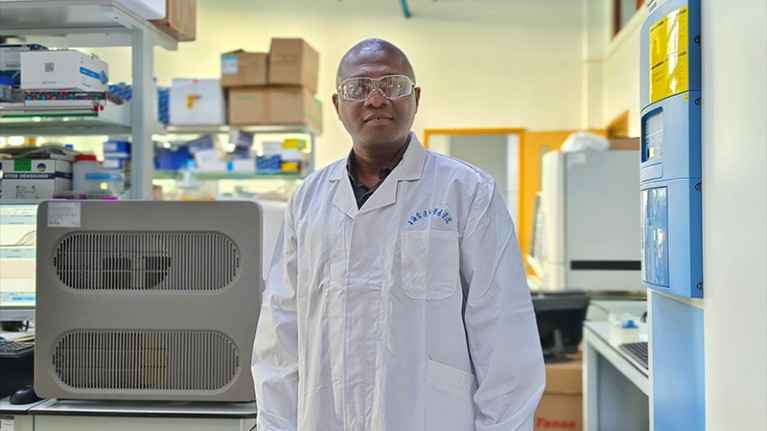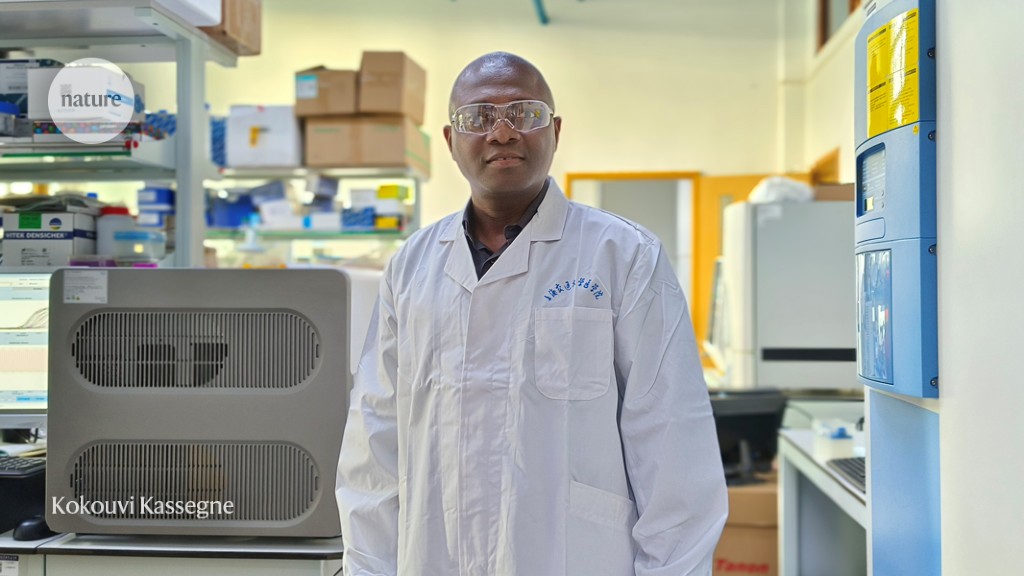
Kokouvi Kassegne is an assistant professor at Shanghai Jiao Tong University in China.Credit: Kokouvi Kassegne
Over the past two decades, the scientific ties between Africa and China have grown stronger. China has invested in a variety of infrastructure projects in Africa, such as the Sino–Africa Joint Research Center in Juja, Kenya. In 2018, China announced a US$60-billion development plan, which included 50,000 scholarships for African people to study in China.
After earning his bachelor’s and master’s degrees in life sciences from the University of Lomé in Togo, Kokouvi Kassegne secured a scholarship to study in China. In 2007, he moved to Hangzhou to pursue a predoctoral programme and a PhD in medicine, with a focus on pathogenic organisms. Kassegne, who is now an assistant professor of global health at Shanghai Jiao Tong University in China, describes the challenges he faced and how he created his own career opportunities abroad.
How did you get interested in science?
I was born and grew up in Atakpamé, Togo — a town of around only 90,000 people. At high school, I took courses in physics and natural sciences, and had the opportunity to do experiments. At the time, I thought I should become a physician, but I didn’t pass the required examination, so I decided to embrace the natural sciences instead. I wanted to understand more about human beings and other animals in terms of evolution and biology.
What brought you to China?
I was curious about what it would be like to live there. In 2007, I moved to Hangzhou, which has a population of more than 10 million people, to start a predoctoral programme at Zhejiang University. I was shocked by the culture and there were some surprising and unexpected issues that I had to handle.
Are you a postdoc working in academia or industry? Share your career experiences with Nature
For instance, I found that many Chinese people are shy when it comes to interacting with non-local people or people who do not speak their language. I was also shocked that shop assistants in China rarely greet, thank or smile at customers who they don’t know personally. But then I learnt that it’s customary to thank only people who are of a higher social status than you. At the time, I got to know a few other PhD candidates who came to China from Africa. I also spent a year learning Mandarin before starting my PhD.
Did you face any challenges after your PhD?
My PhD research focused on a tropical disease called leptospirosis, which is a blood infection caused by the bacterium Leptospira interrogans. After earning my PhD in 2013, I couldn’t secure any postdoctoral positions, so I volunteered for a year as a research assistant in my department at Zhejiang University. It was challenging. I had to work out what to do financially and how to create career opportunities for myself, because I didn’t want to have a gap between my PhD and my next position. I still had some funding from my scholarship, but I also relied on financial and emotional support from my wife and family.
In 2014, I applied for a postdoctoral research fellow position to study malaria at the National Institute of Parasitic Diseases in Shanghai, China. My dream is to do research that contributes not only to my home country, but also to other low- and middle-income countries, where malaria and other endemic diseases are abundant. At the time, I doubted myself and my ability to conduct independent research, so I was surprised when I got the position. It helped me to realize I was capable. From that position, more doors opened for me to get involved in research collaborations that helped me to further my career.
How did you navigate a new language?
In addition to French and English, I can speak some West African dialects, such as Ifè, which is a variant of Yorùbá spoken in Nigeria and Benin, as well as Éwé, which is widely spoken in Togo, Benin and Ghana. When I moved to China, it was tough to overcome the language barrier to fulfil my professional duties. When I started my doctoral programme in 2008, most of the major courses I took were in Mandarin. When I became an assistant professor at Shanghai Jiao Tong University, I had to improve my Mandarin and find translators that could help me to navigate the university system and apply for funding. Mandarin is the primary language used at the university during lectures, faculty meetings and discussions with administrative staff. I took about a year of academic courses in Mandarin and Chinese culture, these were helpful for basic knowledge and communication, but they weren’t necessarily beneficial for my professional work. It was also difficult to improve my language skills on top of doing research, preparing lectures and being involved in departmental committees.
What advice do you have for young researchers interested in studying abroad?
Not all people, especially people from Africa, have the opportunity to study abroad. But if there’s an opportunity presented to you, you have to believe in yourself and go for it. Sometimes you underestimate yourself or feel that you are not capable. Self-confidence is really important, but you also need guidance and mentors. Neither my PhD supervisor nor my postdoc adviser was from Africa, but they were great mentors who helped me to grow my career and prove that I could be successful in science. In 2012, I met some other African people working in research and development industries based in other cities in China, including Shanghai, Beijing and Shenzhen. And in 2021 I encountered some with faculty positions. Now I’m in a position to recruit graduate students and supervise young scientists coming to study in China. I’m honoured to give back and serve as a guide for others.
This interview has been edited for length and clarity.








More News
How I fled bombed Aleppo to continue my career in science
Powerful ‘nanopore’ DNA sequencing method tackles proteins too
US funders to tighten oversight of controversial ‘gain-of-function’ research